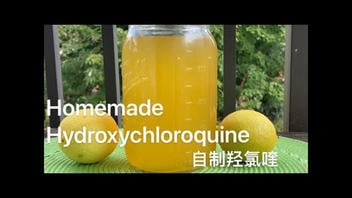
Can hydroxychloroquine be made at home by boiling grapefruit and lemon peels in water? No, that's not true: This claim is "totally false," Dr. Joseph Fortunak, professor of chemistry and pharmaceutical sciences at Howard University, told Lead Stories. "Absolutely hydroxychloroquine CANNOT be made by boiling grapefruit and/or lemon peels in water."
The claim appeared as a video (archived here) where it was published on YouTube on August 22, 2021, under the title "Home Recipe For Hydroxychloroquine (HCQ) , cool down the liquid with LID on." It opened:
Hi guys, welcome back to my channel. Today I'm gonna show you how to home-make hydroxychloroquine.
Click below to watch the video on YouTube:
(Source: YouTube screenshot taken on Mon Jan 3 13:45:21 2022 UTC)
The video, posted on the "Mama natural and beyond" YouTube channel, says in its description section:
WHAT IS HYDROXYCHLOROQUINE EXACTLY? IT IS NOTHING BUT QUININE. SOMETHING THAT ANYONE CAN MAKE AT HOME!
The nearly six-minute video instructs users to get some "organic grapefruits and organic lemons," and shows footage inside a Whole Foods grocery store. The instructions in the video include:
- Starting at the 1:52 mark, a narrator spends nearly two minutes of the video showing how to peel the skin of the fruits, then says to use three cups of water to cover the peels.
- At 4:17 The narrator says, "OK, so it's boiling, as soon as it's boiled we're gonna lower the heat and just that simmer for three hours with the lid on."
- At 4:48 the narrator instructs "after three hours turn off the heat and with the lid on to let it cool down completely before you strain it. Then we're gonna transfer to a clean glass jar and keep it in the refrigerator to store."
- At 5:32 the narrator says, "and guys here we have it, super easy, very effective homemade hydroxychloroquine in your kitchen."
Hydroxychloroquine cannot be made at home. It is made by chemical synthesis in a laboratory and is not a natural product found in the peel of citrus fruits.
Dr. Fotunak emailed Lead Stories on January 3, 2021 with the following details about the false claim:
Boiling grapefruit, lemon, orange, lime - any kind of citrus peels in water - will release low molecular weight (small) molecules called terpenes. These include limonene, alpha-pinene, beta-caryophylene, humulene, squalene, and carvone (among others). None of these are related to hydroxychloroquine. They are variably present in everyday household products such as Pine-Sol (pinene), or Mr. Clean (limonene). They also have anecdotal activity in helping with mood (relaxation, alertness, stress relief). Several are used in cosmetics or lotions (squalene, humulene, caryophylene). I have used them in CBD (cannabidiol) products to enhance activity of the CBD. They are NOT in any way structurally related to hydroxychloroquine. NO ONE has ever made hydroxychloroquine by boiling these together.
My Undergraduate students boil citrus peels in water and then "steam distill" them to isolate limonene. They never make any hydroxychloroquine as a byproduct. This process my students do in the lab is well known, well understood, and everyone knows there are no compounds remotely related to hydroxychloroquine generated in this operation.
I and my research (PhD) students HAVE MADE hydroxychloroquine in the lab. The processes used to make hydroxychloroquine are not related in any sense to boiling peels from any citrus fruits in water.
The FDA first granted emergency approval for hydroxychloroquine as a COVID treatment in March 2020, but then reversed that permission on June 15, 2020, after investigators in a nationwide clinical trial found evidence it caused serious heart problems. The FDA announced:
Based on its ongoing analysis of the EUA and emerging scientific data, the FDA determined chloroquine and hydroxychloroquine are unlikely to be effective in treating COVID-19 for the authorized uses in the EUA [emergency use authorization]. Additionally, in light of ongoing serious cardiac adverse events and other potential serious side effects, the known and potential benefits of chloroquine and hydroxychloroquine no longer outweigh the known and potential risks for the authorized use.












